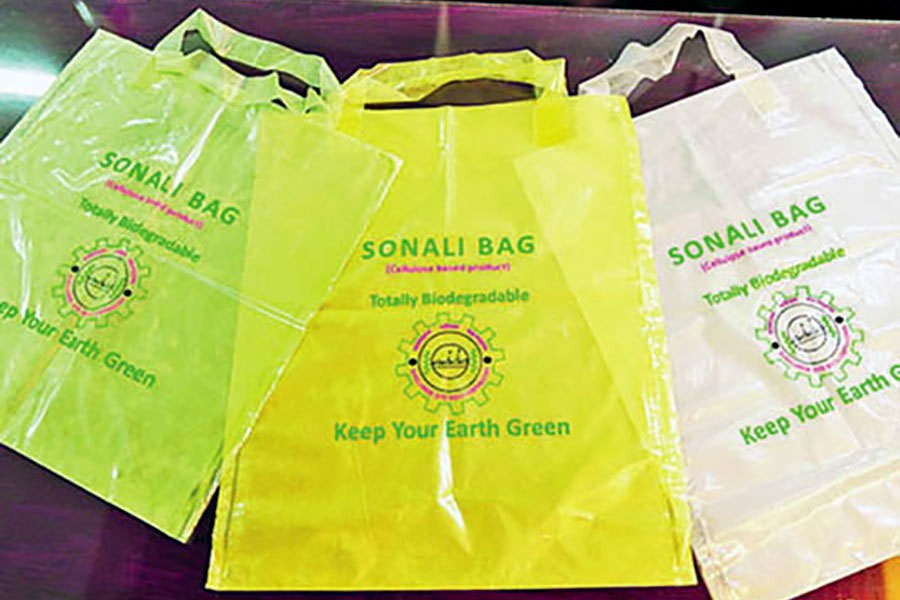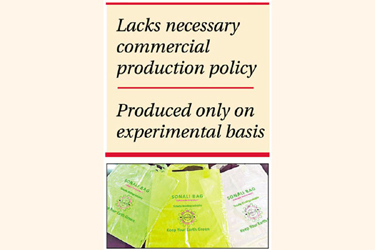
Published :
Updated :

As the government moves to phase out polythene bags from super shops to kitchen markets, demands for alternatives see a further push, including the commercial production of Sonali bag, a biodegradable bag made of jute polymer.
Bangladesh banned polythene bags in 2002. However, it is still in the market with over 300 informal factories operating in Dhaka and other parts of the country to produce the bags. Dhaka city and surrounding areas alone consumed about 220 million polythene bags.
The interim government has announced to strictly implement the ban with an effect in super shops on October first and in kitchen markets on November first. The government also said it will drive against polythene bags from December.

Experts believe that the demands for alternatives are a reality although there are hardly any cost-effective alternatives in the market against polythene bags.
The jute-produced Sonali bag could be an alternative to polythene bags. However, the invention is still in the incubator and sees no big push despite lots of assurance from the government to go for mass or commercial production mainly due to slow progress in fund release and formulating policy for commercial production.
In January this year, the ousted government announced to allocate Tk 1.0 billion to scientist Mubarak Ahmad Khan, inventor of the bag, to bring in further progress in the bag and to go for mass production.
He is a Scientific Advisor at Bangladesh Jute Mills Corporation.
"We have a capacity of 1.0 ton per day but a lack of manpower and the nature of non-industrial production is a major hurdle," he said referring to the 9am-5pm production hour.
"We cannot go for production as expected. The production could be multiplied if we could industrialise the process."
The Ministry of Textiles And Jute wants the Sonali bag to be a major alternative to polythene bags in the market, he added, saying that officials regularly hold meetings with him in this regard.
The price of the bag is still not cost effective with Tk 10 per bag. Mubarak Ahmad believes that the government could half the price right now if they want and facilitate the production.
The raw materials he buys from the local and global markets for experimental production are costly. If the raw materials are procured for industrial production then the cost could be reduced further.
There are allegations that influential plastic industry owners, previously backed by the ex-prime minister Sheikh Hasina-led government, illegally put pressurise on the relevant authorities so commercial production of the bag could not be initiated.
The initiative also could not grab private investment due to lack of policy support.
"We need policy support in selling and transferring the technology. We also need a policy to accept private funding," Mubarak Ahmad added.
The scientist said he is ready to share his recipe with private companies for commercial production.
"But for this we must need an official procedure. Previous governments showed interest but someone has to take the responsibility to make this happen."
"I cannot do more being a government employee. It is the right time to make industrial production," he added.
Critics say as the initiative is still under the government jurisdiction, it does not see major push up.
Md. Abdur Rauf, secretary, Ministry of Textiles And Jute, told the FE that his ministry is working to go for mass and commercial production of the Sonali bag. "Marketing and commercial production are our prime focus now as we progress substantially."
The official said that they have already discussed with concerned companies in some countries, including in Japan, in search of machines for commercial production as the production can be conducted with customised machines.
"We need complete machines so that we can get the finished products from the factories. And, for that we are working," he added.
Currently the production is being done on an experimental basis. So, the pricing has not been fixed yet officially. There will be a piloting on marketing and commercial production of the Sonali bag, according to the official.
The planning commission recently returned the project proposal by Mubarak Ahmad with some observations in it. They will soon forward the revised copy once finished to the planning commission for approval, Abdur Rauf added.
"Once approved, the fund of Tk 1.0 billion will be started releasing against the project," he believed.
However, Mubarak Ahmad told the FE that he has not received the copy forwarded by the planning commission yet.
Shahriar Hossain, secretary general of Environment and Social Development Organization (ESDO), who has been a long-time activist to control indiscriminate use of plastic in the country, said that the government has been taking preparation in the last 22 years to implement the polythene bag ban without a fruitful outcome.
However, the interim government is determined to eliminate polythene bags from the market, he said.
"Once we incorporate the ban, alternatives will be there as so many entrepreneurs already come up with environment friendly options," he told the FE.
Bags made of different natural fibers are among the alternatives, and major funding announcements from the government and private sector would overcome the limitations in bringing up new alternatives.
nsrafsanju@gmail.com


 For all latest news, follow The Financial Express Google News channel.
For all latest news, follow The Financial Express Google News channel.